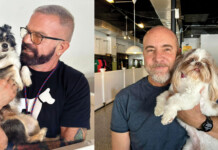 Wentworth Miller was born in England to American parents, and he was raised in Park Slope, Brooklyn…
Wentworth Miller was born in England to American parents, and he was raised in Park Slope, Brooklyn…
 LGBT HISTORY MONTH PROFILES
LGBT HISTORY MONTH PROFILES
by: Mike Halterman
As you already know, October is LGBT History Month. Each week throughout the month, we will be profiling two of the people named to Equality Forum’s LGBT History Month icon lists, to showcase the great things LGBT people have done, and are doing.
Wentworth Miller
(born June 2, 1972)
Wentworth Miller was born in England to American parents, and he was raised in Park Slope, Brooklyn, where he moved with his family when he was just one year old. He is Ivy League-educated, having attended Princeton University and graduating with a degree in English literature.
He moved to Los Angeles in 1995 for a full-time acting career, and he received his first TV casting in 1998 when he appeared on an episode of Buffy the Vampire Slayer. His first starring role was in the ABC mini-series Dinotopia in 2002. He acted opposite Anthony Hopkins and Nicole Kidman in the 2003 film The Human Stain. He was also featured in the Mariah Carey music videos “It’s Like That” and the smash hit “We Belong Together.”
 His big break occurred in 2005 when he was cast as Michael Scofield in the FOX drama Prison Break. An instant success, the series lasted for four seasons before ending in 2009. He was nominated for a Golden Globe Award for Best Actor in a Television Drama. After the series ended, Miller wrote a psychological thriller screenplay called Stoker. He was recognized for having one of the 10 best unproduced screenplays in Hollywood for the year 2010. His screenplay caught the interest of Korean director Park Chan-wook, and production started on what would become a feature film in 2011. Stoker was released in theaters in 2013 and starred Mia Wasikowska and Nicole Kidman.
His big break occurred in 2005 when he was cast as Michael Scofield in the FOX drama Prison Break. An instant success, the series lasted for four seasons before ending in 2009. He was nominated for a Golden Globe Award for Best Actor in a Television Drama. After the series ended, Miller wrote a psychological thriller screenplay called Stoker. He was recognized for having one of the 10 best unproduced screenplays in Hollywood for the year 2010. His screenplay caught the interest of Korean director Park Chan-wook, and production started on what would become a feature film in 2011. Stoker was released in theaters in 2013 and starred Mia Wasikowska and Nicole Kidman.
Having previously denied being gay while starring in Prison Break, he finally came out to the public in the summer of 2013. After being invited to the St. Petersburg International Film Festival in Russia, his letter declining the invitation was well publicized in the media, which said in part, “I cannot in good conscience participate in a celebratory occasion hosted by a country where people like myself are being systematically denied their basic right to live and love openly,” referring to the many laws passed by Russian authorities against LGBT people and their basic dignity. He later spoke out at length about his attempt at suicide while closeted, remarking, “When someone asked me if that was a cry for help, I said no, because I told no one. You only cry for help if you believe there’s help to cry for.” In the past few months, by revealing his struggles public, he has changed his public image, ultimately becoming an inspiration for others who are struggling to come out.















